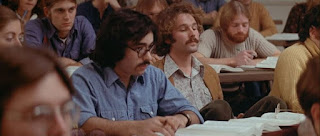The Story: James Bridges had a new movie coming out and he was taking it around to different cities than the usual Hollywood try-out spaces. Like college campuses.
It made perfect sense. It was a movie about the college experience and what better place to really test it was take it to people going through that very situation...especially as it was a movie that meant to appeal to a younger audience.
Bridges had been fascinated with the law after being sued in the course of writing and directing the film The Baby Maker. Where did these minds come from, he wondered. How could they negotiate the spider's web of precedents, arguments, counter-arguments, theory, and motions. It had nothing to do with "Perry Mason" on television, it was discipline, theater, and higher thought all performed on a stage where every missed mark would be called out.
Reading John Jay Osborn's book, Bridges did a very faithful adaptation for The Paper Chase, and after the disastrous performance of The Baby Maker, Bridges toured the movie to build "buzz" and word-of-mouth. Seattle had developed a reputation of being "a movie town" in the 1970's—Richard Rush had launched The Stunt Man there and Francis Ford Coppola screened rough cuts of his films in the area. It didn't hurt that Seattle was one of the only city where a film Bridges had earlier written, Colossus: The Forbin Project, enjoyed a long theatrical run. What better place to show it?
He was very forthcoming about the making of the movie—the logistics of making a film about Harvard Law School when Harvard only allowed a couple days access to the campus—solved by filming much of it in Toronto. A lot of questions about John Houseman—it was not his film debut as the entertainment press liked to harp, as he'd had an un-credited role in Seven Days in May—and how he was such a Hollywood fixture, first working with Orson Welles at RKO and then falling into the Hollywood fold as a producer at Paramount and M-G-M.
And quite a few questions about this particular scene, which sticks out as it's one of the few scenes that are overtly confrontational. The plan by cinematographer Gordon Willis* was to create a classroom amphitheater set that student Hart would appear lost in among a body of collegiate fellows. The back wall could be removed so that Willis could employ a long lens to make them all appear shrunken and crowded together. Houseman's Kingsfield, however, would be center-stage, imposing and solo, the "power" in the room. Houseman was not Bridges' first choice, but once others declined, Bridges had Houseman do a screen-test for the studio, and his old theater professor and mentor—he persuaded Norman Lloyd to hire Bridges to write scripts for "Alfred Hitchcock Presents"—won the part.
I once saw Houseman walking through the UCLA library while I was visiting. It was like watching Kingsfield.
The Set-Up: James Hart (Timothy Bottoms) first year law student is deeply entrenched in his study efforts and takes a different tack with his Contracts course: he becomes obsessed with the professor, the highly regarded Professor Charles Kingsfield (John Houseman in his Oscar winning role), studying him as much as the volumes of cases and suits that are part of the curriculum. He begins to think that he and Kingsfield might have some unspoken relationship, which, to the aloof Kingsfield, couldn't be farther from the truth. He does have a relationship with Susan Fields (Lindsey Wagner)—who, unbeknownst to him is Kingsfield's daughter. One this is revealed to him, she tries to discourage Hart's obsession with her father. Of course, he takes it a little too far.
Action.
HART: However, when I have something relevant to say...I shall raise my hand.
HART: You...are a son of a bitch, Kingsfield!
KINGSFIELD: Mr. Hart!
Words by James Bridges (and John Jay Osborne Jr.)
Pictures by Gordon Willis and James Bridges
* Willis, who shot the "Godfather" movies, Alan Pakula's paranoid thrillers and Woody Allen's films in the 1970's became something of a superstar cinematographer after the first Godfather movie. One other prominent film name working on The Paper Chase was John Williams, a few years before he became famous for his work on Jaws and Star Wars.


























































No comments:
Post a Comment